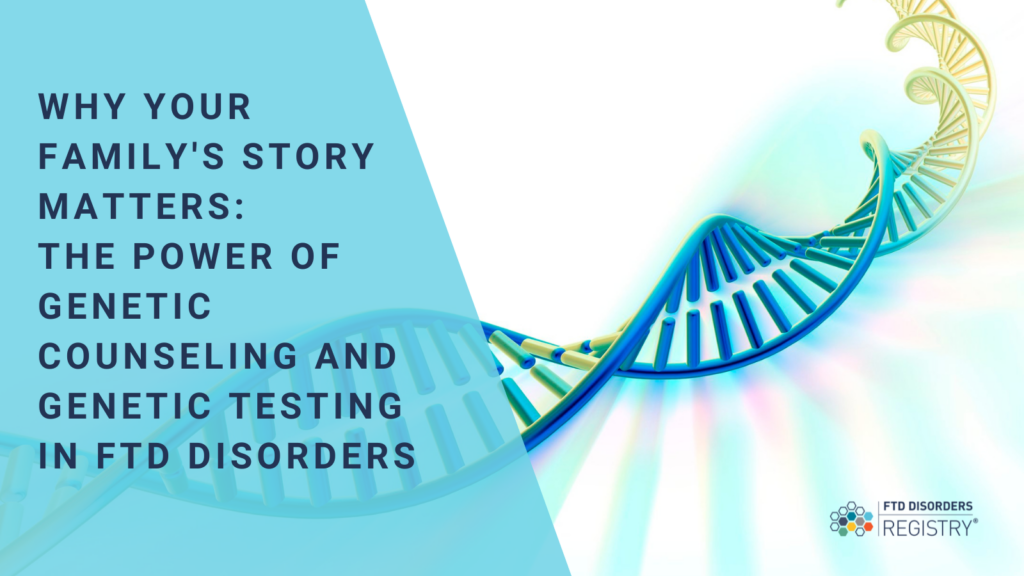PRESS & NEWS
Why Your Family’s Story Matters: The Power of Genetic Counseling and Genetic Testing in FTD Disorders

Understanding the genetic component of FTD can help families make informed health decisions and contribute to critical research that is paving the way toward earlier detection and better treatments.
When someone in the family is diagnosed with frontotemporal degeneration (FTD), one of the hardest questions to ask is: Could this happen to someone else in our family, too?
The answer is not always clear, but it is a question worth exploring.
Understanding the genetic component of FTD can help families make informed health decisions and contribute to critical research that is paving the way toward earlier detection and better treatments. One of the best ways to begin that process is through genetic counseling and testing.
Yet many people are hesitant. That is completely normal. If you or someone you love is unsure about participating in genetic counseling, testing, or FTD disorders research, here is what you should know.
What Is Genetic Counseling – And Why Might It Matter for FTD?
Genetic counseling is not genetic testing. It is simply a conversation with a trained professional who helps you:
- Understand how genetics may relate to your family’s experience with FTD
- Address your concerns
- Decide whether testing is right for you
- Learn what your options are – without pressure to take any next steps
For some forms of FTD disorders, especially those with a known inherited component (like GRN, MAPT, or C9orf72 mutations), family history plays a powerful role in diagnosis and treatment. Even if your loved one’s case appears sporadic or “non-genetic,” research shows there can still be value in exploring these conversations.
To find a qualified provider, the National Society of Genetic Counselors (NSGC) offers helpful information about what genetic counselors do, along with a searchable directory to locate certified counselors for in-person or telehealth appointments. You can also use the American College of Medical Genetics and Genomics (ACMG) Genetics Clinics Database to find a genetics clinic near you in the United States.
“But I am Not Sure I Want to Know…”
That is okay. Here are some common concerns and the facts that might help ease your mind:
“What if it is bad news?”
Finding out you carry a genetic risk can feel scary, but it is not a diagnosis. It is knowledge. And with knowledge comes power: the power to plan ahead, take proactive steps, and help the next generation do the same.
“I do not want to be discriminated against.”
In the U.S., laws like the Genetic Information Nondiscrimination Act (GINA) protect against genetic discrimination in health insurance and employment. Similar protections exist in many countries. A genetic counselor can help you understand what applies to you.
“I am too old. It will not change anything for me.”
You might be right. It might not change your personal medical care. But your participation could offer life-changing insight for your children, grandchildren, siblings, nieces, and nephews. You might be the key to better treatments or earlier diagnosis for someone you love.
“I feel fine. Why should I test?”
Genetic risks can be present even when symptoms are not. Learning about them early can lead to better monitoring and, in the future, access to clinical trials or preventive care.
Start with a Simple Step: Join the FTD Disorders Registry
If you are not ready for genetic counseling or testing yet, there is still an easy and impactful way to get involved: join the FTD Disorders Registry.
Signing up is:
- Free and takes just a few minutes
- Confidential. Your personal information is protected and never shared
- Flexible. You choose what information to provide from the convenience of home
By participating in the Registry, you are helping researchers better understand how FTD disorders affect real people and families. You will also hear about research studies, clinical trials, and new resources, and you will decide if and when you want to participate.
Whether you are a patient, caregiver, or family member, your experience can help drive the future of FTD disorders research.
Learn more or sign up today at www.ftdregistry.org.
One Family Member Can Make a Big Difference
Whether you are ready to take action now or just beginning to explore, starting the conversation is what matters most. Even if only one person in a family undergoes counseling or participates in research, the insights gained can benefit everyone.
You do not have to commit to anything today. You do not have to get tested if you are not ready. You just have to be willing to ask questions and talk to someone who can help you find the answers.
You are Not Alone
FTD disorders can feel overwhelming, but no one has to face it alone. By learning more about your genetic story and sharing it with the people and professionals who care, you are helping build a future of hope for generations to come.
Whether you choose to take the next step or just explore the possibility, your experience matters. And it starts with a conversation.
If you are looking for support or have questions, the AFTD HelpLine is here for you:
1-866-507-7222
info@theaftd.org
Compassionate support, clear answers, and reliable resources are just a call or email away.
Together we can find a cure for ftd
The FTD Disorders Registry is a powerful tool in the movement to create therapies and find a cure. Together we can help change the course of the disease and put an end to FTD.
Your privacy is important! We promise to protect it. We will not share your contact information.



